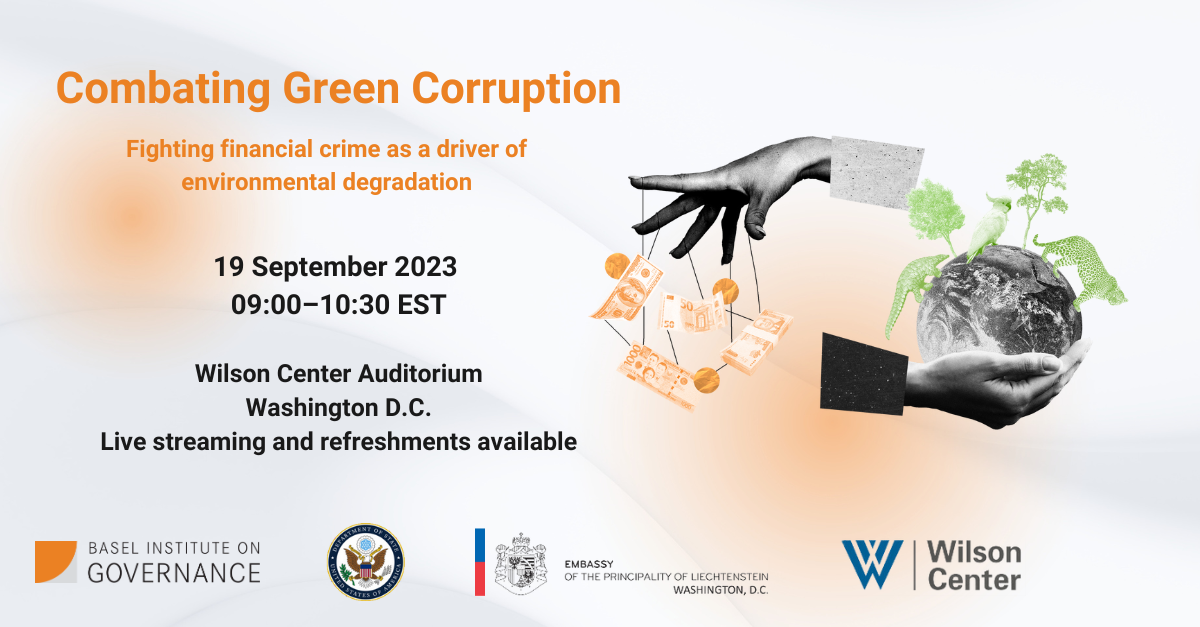19 September: A high-level conversation on fighting financial crime as a driver of environmental degradation

Senior representatives of the U.S., Ukrainian and Liechtenstein Governments are gathering at the Wilson Center in Washington, D.C. on 19 September 2023 for a high-level panel on tackling the “Green Corruption” that is destroying our environment. The 1.5-hour event is co-organised by the Embassy of the Principality of Liechtenstein to the U.S., the U.S. Department of State, the Wilson Center and the Basel Institute on Governance.
The event is a unique chance to find out how those at the forefront of fighting corruption and illicit financial flows approach financial crimes linked to environmental degradation.
Speakers include:
- Richard Nephew, Coordinator on Global Anti-Corruption, U.S. Department of State
- Oleksandra Azarkhina, Deputy Minister, Ministry for Communities, Territories and Infrastructure Development of Ukraine
- Andrea Gacki, Director of FinCEN
- Himamauli Das, Former Director of FinCEN
- Roberto Troya, Senior Vice President for WWF U.S. country offices and Regional Director for Latin America and the Caribbean, WWF US
- Juhani Grossmann, Team Leader Green Corruption, Basel Institute on Governance
Ambassador Georg Sparber, Ambassador of Liechtenstein to the United States, will give the welcoming address. Lauren Herzer Risi, Director of the Environmental Change and Security Program at the Wilson Center, will moderate.
All are welcome to attend this free event and to join us for post-event refreshments. Live streaming is available for those unable to attend in person.
The issue
Environmental degradation and financial crime are often intricately intertwined. Various international organisations and fora have recognized this complex relationship, including the FATF, the UN General Assembly, the OECD and the G20.
By identifying and disrupting illicit financial flows, nature crimes such as illegal mining, wildlife trafficking, logging and waste dumping can effectively be tracked, disrupted and prosecuted. Corruption is often an integral part of such criminal practices and should therefore be a focus of the international community in addressing nature crime.
Forward-looking Governments and civil society organisations are increasingly designing policy shifts, interventions and programs to address Green Corruption. The United States Government, for example, has provided major funding to strengthen enforcement and prevention efforts in natural resource-rich countries, engage with the FATF on illicit financial flows and use the Lacey Act to prosecute international criminal networks targeting the environment.
The event
The event will highlight the “Green Corruption” approach to tackling nature crime, as well as measures taken by Governments, civil society and international actors in response.
The speakers will explore best practices and concrete examples in fighting Green Corruption and identify ways to strengthen the normative framework in the run-up to the Conference of the States Parties of the UN Convention against Corruption, hosted by the United States in Atlanta, Georgia from 11 to 15 December 2023.
The panel discussion will look into questions such as:
- What tools exist to fight illicit financial flows associated with Green Corruption?
- What resources do officials, civil society and the business community have to address cases of Green Corruption?
- How can prevention, oversight and enforcement be improved?
- How can the transition to the green economy be achieved without criminal exploitation of people and the environment, for example when sourcing critical minerals?
Register and find out more
- Register on the Wilson Center web page.
- Download the flyer/invitation.
- Learn about the Basel Institute’s Green Corruption programme, established with core funding from the Principality of Liechtenstein and supported by the U.S. Government.



